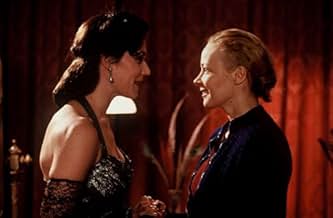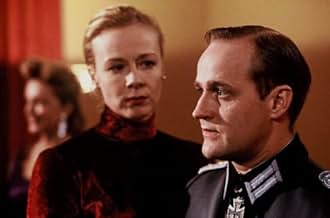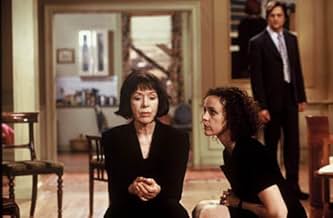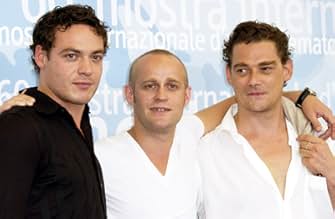PUNTUACIÓN EN IMDb
6,7/10
2,6 mil
TU PUNTUACIÓN
Añade un argumento en tu idiomaAfter the death of her father, Hannah becomes concerned with the strange behavior of her mother. As her mother's troubled childhood is revealed, Hannah realizes how little she ever knew.After the death of her father, Hannah becomes concerned with the strange behavior of her mother. As her mother's troubled childhood is revealed, Hannah realizes how little she ever knew.After the death of her father, Hannah becomes concerned with the strange behavior of her mother. As her mother's troubled childhood is revealed, Hannah realizes how little she ever knew.
- Dirección
- Guión
- Reparto principal
- Premios
- 9 premios y 3 nominaciones en total
Reseñas destacadas
I'm always surprised about how many times you'll see something about World War 2 on the German national television. You would think they don't like to open old wounds, but there isn't a week that goes by without a documentary or a movie about the horror and atrocities of this war. Perhaps it's a way of dealing with their past, I don't know, but you sure can't blame them of ignoring what happened. And it has to be said: most of those documentaries are really worth a watch because they never try to gloss over the truth and the same can be said about their movies (think for instance about "Der Untergang" or "The Downfall" as you might now it) which are also very realistic.
One of those movies is "Rosenstrasse". It tells a true story and deals with the subject of the mixed marriages during the war, even though the movie starts with a family in the USA, at the present day. After Hannah's father died, her mother all a sudden turned into an orthodox Jew even though she hasn't been very religious before. She doesn't know where the strange behavior of her mother comes from, but as she starts digging in her mother's troubled childhood, Hannah understands how little she has ever known about her mother's past.
The fact that this movie deals with the subject of the mixed marriages during the Nazi regime is already quite surprising. For as far as I know, there hasn't been another movie that deals with this subject. (For those who didn't know this yet: Being married to a so-called pure Aryian man or woman meant for many Jews that they weren't immediately sent to one of the concentration camps, but that they had to work in a factory). But it does not only tell something about the problems of the mixed marriages, it also gives a good idea of how these people were often seen by their own parents and relatives. How difficult it sometimes was for them during the Nazi regime and how these people, most of the time women, did everything within their power to free their men, once they were captured and locked away in for instance the Rosenstrasse...
The acting is really good and the story is very well written, although the way it was presented in the beginning didn't really do it for me (and that's exactly the only part that you'll get to see in the trailer). Perhaps it's just me, but I would have left out a big part of what happens in the present day. At least of the part that is situated in the USA, because the part where Hannah goes to Berlin and talks to someone who knows more about her mother's past, definitely works.
If you are interested in everything that has something to do with the Second World War, and if you aren't necessarily looking for a lot of action shots, than this is definitely a movie you should see. This isn't a movie in which you'll see any battles or gunfights, but it certainly is an interesting movie, because it gives you an idea about an aspect of the war only little is known of. I give it an 8/10.
One of those movies is "Rosenstrasse". It tells a true story and deals with the subject of the mixed marriages during the war, even though the movie starts with a family in the USA, at the present day. After Hannah's father died, her mother all a sudden turned into an orthodox Jew even though she hasn't been very religious before. She doesn't know where the strange behavior of her mother comes from, but as she starts digging in her mother's troubled childhood, Hannah understands how little she has ever known about her mother's past.
The fact that this movie deals with the subject of the mixed marriages during the Nazi regime is already quite surprising. For as far as I know, there hasn't been another movie that deals with this subject. (For those who didn't know this yet: Being married to a so-called pure Aryian man or woman meant for many Jews that they weren't immediately sent to one of the concentration camps, but that they had to work in a factory). But it does not only tell something about the problems of the mixed marriages, it also gives a good idea of how these people were often seen by their own parents and relatives. How difficult it sometimes was for them during the Nazi regime and how these people, most of the time women, did everything within their power to free their men, once they were captured and locked away in for instance the Rosenstrasse...
The acting is really good and the story is very well written, although the way it was presented in the beginning didn't really do it for me (and that's exactly the only part that you'll get to see in the trailer). Perhaps it's just me, but I would have left out a big part of what happens in the present day. At least of the part that is situated in the USA, because the part where Hannah goes to Berlin and talks to someone who knows more about her mother's past, definitely works.
If you are interested in everything that has something to do with the Second World War, and if you aren't necessarily looking for a lot of action shots, than this is definitely a movie you should see. This isn't a movie in which you'll see any battles or gunfights, but it certainly is an interesting movie, because it gives you an idea about an aspect of the war only little is known of. I give it an 8/10.
Berlin-born in 1942 Margarethe von Trotta was an actress and now she is a very important director and writer. She has been described, perhaps even unfairly caricatured, as a director whose commitment to bringing a woman's sensibility to the screen outweighs her artistic strengths. "Rosenstrasse," which has garnered mixed and even strange reviews (the New York Times article was one of the most negatively aggressive reviews I've ever read in that paper) is not a perfect film. It is a fine movie and a testament to a rare coalescing of successful opposition to the genocidal Nazi regime by, of all peoples, generically powerless Germans demonstrating in a Berlin street.
Co-writer von Trotta uses the actual Rosenstrasse incident in the context of a young woman's search for information about her mother's never disclosed life as a child in the German capital during World War II.
The husband of Ruth Weinstein (Jutta Lampe) has died and in a surprising reversion to an orthodox Jewish lifestyle apparently hitherto in long abeyance, Ruth not only "sits shivah" (the Jews' week-long mourning ritual) but she insists on following the strict proscriptions of her faith. Her apartment in New York City reflects the affluence secured by her deceased spouse's labors. Her American-born daughter, Hannah (Maria Schrader) and her brother are a bit put-off by mom's assumption of restrictive orthodox Jewish practices but they pitch in. The mother coldly rejects the presence of Hannah's fiance, a non-Jew named Luis (Fedja van Huet). A domestic crisis might well erupt as Ruth warns that she'll disown Hannah if she doesn't give up doting, handsome Luis. Stay tuned.
A cousin arrives to pay her respects and also drops clues to an interested Hannah about a wartime mystery about mom's childhood in Berlin. Hannah is intrigued - she queries her mom who resolutely refuses to discuss that part of her life. This is very, very realistic. I grew up with parents who fled Nazi Germany just in time and I knew many children whose families, in whole but usually in part, escaped the Holocaust. Those days were simply not discussed.
So Hannah, having learned that a German gentile woman saved Ruth's life, traipses off to Berlin hoping to find the savior still breathing. Were she not, this would have been a very short film. But Ruth, pretending to be a historian, locates 90 year-old Lena Fischer (Doris Schade), now a widow. As the happy-to-be-interviewed but shaken up by repressed memories Lena tells her story, the scenes shift fairly seamlessly between present day Berlin and the war-time capital.
The young Lena of 1943 (Katja Riemann) was a fine pianist married to a Jewish violinist, Fabian Fischer (Martin Feifel). With the advent of the Nazi regime he was required to use "Israel" as a middle name just as Jewish women had to add "Sarah" to their names(incidentally I wish IMDb had not given Fabian's name on its characters list with the false "Israel" included-it simply perpetuates a name applied by Nazis as a mark of classification and degradation).
While Germany deported most of its Jewish population to concentration camps, those married to "Aryans" were exempted. For a time. Until 1943 when the regime decided to take them too (most were men; a minority were Jewish women married to non-Jews). The roundup is shown here in all its frightening intensity.
The young Lena tries to locate her husband. All she and many other women know is that they're confined in a building on Rosenstrasse. The crowd of anxious women builds up, some piteously seeking help from German officers who predictably refuse aid and also verbally abuse them ("Jew-loving whore" being one appellation). As a subplot Lena more or less adopts eight-year-old Ruth who hid when her mother was seized (remember, Ruth is now sitting shiva in Manhattan). The child Ruth is fetchingly portrayed by Svea Lohde.
Through increasingly angry protestations the women finally prevail. The men, and a handful of women, are released. As in the real story the Nazis gave in, one of the rare, almost unprecedented times when the madmen acknowledged defeat in their homicidal agenda (another was the termination of the euthanasia campaign to rid the Reich of mental defectives and chronic invalids but that's another story).
Von Trotta builds up the tension and each woman's story is both personal and universal. Hannah continues to prod the aging Lena who slowly, one gathers, begins to suspect she's not dealing with an ordinary historian but rather someone with a need to learn about the girl she rescued, the child whose mother was murdered.
The contrasts between Rosenstrasse of 1943, a set, and the street today in a bustling, rebuilt, unified Berlin provide a recurring thematic element. Today's Berlin bears the heritage but not the scars of a monstrous past. Von Trotta makes that point very well.
The main actors are uniformly impressive. Lena's husband while strong is also shown as totally helpless in the snare of confinement with a likely outlook of deportation (which is shown to have been clearly understood by all characters - including the local police and military - as a one-way trip to oblivion). The older Ruth is catalytically forced to confront demons long suppressed in her happy New York life. Hannah is very believable as a young woman whose father's death triggers a need to discover her family's past. These things happen (although the Times's critic appears not to know that).
Von Trotta's hand is sure but not perfect. A scene with Goebbels at a soiree enjoying Lena's violin playing is unnecessary and distractive. The suggestion that she may have gone to bed with the propaganda minister, the most fanatical top-level Hitler worshiper, to save her husband detracts from the wondrous accomplishment of the demonstrating spouses and relatives. Most of the German officers come from central casting and are molded by the Erich von Stroheim "copy and paste" school of Teutonic nastiness. But that's understandable.
The Rosenstrasse story has been the subject of books and articles and some claim it's a paradigm case for arguing that many more Jews could have been saved had more Germans protested. Unfortunately that argument is nonsense. The German women who occupied Rosenstrasse were deeply and understandably self-interested. Most Germans were located on a line somewhere between passive and virulent anti-Semitism. THAT'S why the Rosenstrasse protest was virtually singular. Whether one buys or rejects the Goldenhagen thesis that most Germans were willing accomplices of the actual murderers it just can not be denied that pre-Nazi endemic anti-Semitism erupted into a virulent strain from 1933 on.
The elderly Lena remarks that what was accomplished by the women was "a ray of light" in an evil time. Most of the men and women sprung from a near death trip survived the war. So "a ray of light" it was and von Trotta's movie is a beacon of illumination showing that some were saved by the courage of largely ordinary women and for every life saved an occasion for celebration exists. And always will.
9/10
Co-writer von Trotta uses the actual Rosenstrasse incident in the context of a young woman's search for information about her mother's never disclosed life as a child in the German capital during World War II.
The husband of Ruth Weinstein (Jutta Lampe) has died and in a surprising reversion to an orthodox Jewish lifestyle apparently hitherto in long abeyance, Ruth not only "sits shivah" (the Jews' week-long mourning ritual) but she insists on following the strict proscriptions of her faith. Her apartment in New York City reflects the affluence secured by her deceased spouse's labors. Her American-born daughter, Hannah (Maria Schrader) and her brother are a bit put-off by mom's assumption of restrictive orthodox Jewish practices but they pitch in. The mother coldly rejects the presence of Hannah's fiance, a non-Jew named Luis (Fedja van Huet). A domestic crisis might well erupt as Ruth warns that she'll disown Hannah if she doesn't give up doting, handsome Luis. Stay tuned.
A cousin arrives to pay her respects and also drops clues to an interested Hannah about a wartime mystery about mom's childhood in Berlin. Hannah is intrigued - she queries her mom who resolutely refuses to discuss that part of her life. This is very, very realistic. I grew up with parents who fled Nazi Germany just in time and I knew many children whose families, in whole but usually in part, escaped the Holocaust. Those days were simply not discussed.
So Hannah, having learned that a German gentile woman saved Ruth's life, traipses off to Berlin hoping to find the savior still breathing. Were she not, this would have been a very short film. But Ruth, pretending to be a historian, locates 90 year-old Lena Fischer (Doris Schade), now a widow. As the happy-to-be-interviewed but shaken up by repressed memories Lena tells her story, the scenes shift fairly seamlessly between present day Berlin and the war-time capital.
The young Lena of 1943 (Katja Riemann) was a fine pianist married to a Jewish violinist, Fabian Fischer (Martin Feifel). With the advent of the Nazi regime he was required to use "Israel" as a middle name just as Jewish women had to add "Sarah" to their names(incidentally I wish IMDb had not given Fabian's name on its characters list with the false "Israel" included-it simply perpetuates a name applied by Nazis as a mark of classification and degradation).
While Germany deported most of its Jewish population to concentration camps, those married to "Aryans" were exempted. For a time. Until 1943 when the regime decided to take them too (most were men; a minority were Jewish women married to non-Jews). The roundup is shown here in all its frightening intensity.
The young Lena tries to locate her husband. All she and many other women know is that they're confined in a building on Rosenstrasse. The crowd of anxious women builds up, some piteously seeking help from German officers who predictably refuse aid and also verbally abuse them ("Jew-loving whore" being one appellation). As a subplot Lena more or less adopts eight-year-old Ruth who hid when her mother was seized (remember, Ruth is now sitting shiva in Manhattan). The child Ruth is fetchingly portrayed by Svea Lohde.
Through increasingly angry protestations the women finally prevail. The men, and a handful of women, are released. As in the real story the Nazis gave in, one of the rare, almost unprecedented times when the madmen acknowledged defeat in their homicidal agenda (another was the termination of the euthanasia campaign to rid the Reich of mental defectives and chronic invalids but that's another story).
Von Trotta builds up the tension and each woman's story is both personal and universal. Hannah continues to prod the aging Lena who slowly, one gathers, begins to suspect she's not dealing with an ordinary historian but rather someone with a need to learn about the girl she rescued, the child whose mother was murdered.
The contrasts between Rosenstrasse of 1943, a set, and the street today in a bustling, rebuilt, unified Berlin provide a recurring thematic element. Today's Berlin bears the heritage but not the scars of a monstrous past. Von Trotta makes that point very well.
The main actors are uniformly impressive. Lena's husband while strong is also shown as totally helpless in the snare of confinement with a likely outlook of deportation (which is shown to have been clearly understood by all characters - including the local police and military - as a one-way trip to oblivion). The older Ruth is catalytically forced to confront demons long suppressed in her happy New York life. Hannah is very believable as a young woman whose father's death triggers a need to discover her family's past. These things happen (although the Times's critic appears not to know that).
Von Trotta's hand is sure but not perfect. A scene with Goebbels at a soiree enjoying Lena's violin playing is unnecessary and distractive. The suggestion that she may have gone to bed with the propaganda minister, the most fanatical top-level Hitler worshiper, to save her husband detracts from the wondrous accomplishment of the demonstrating spouses and relatives. Most of the German officers come from central casting and are molded by the Erich von Stroheim "copy and paste" school of Teutonic nastiness. But that's understandable.
The Rosenstrasse story has been the subject of books and articles and some claim it's a paradigm case for arguing that many more Jews could have been saved had more Germans protested. Unfortunately that argument is nonsense. The German women who occupied Rosenstrasse were deeply and understandably self-interested. Most Germans were located on a line somewhere between passive and virulent anti-Semitism. THAT'S why the Rosenstrasse protest was virtually singular. Whether one buys or rejects the Goldenhagen thesis that most Germans were willing accomplices of the actual murderers it just can not be denied that pre-Nazi endemic anti-Semitism erupted into a virulent strain from 1933 on.
The elderly Lena remarks that what was accomplished by the women was "a ray of light" in an evil time. Most of the men and women sprung from a near death trip survived the war. So "a ray of light" it was and von Trotta's movie is a beacon of illumination showing that some were saved by the courage of largely ordinary women and for every life saved an occasion for celebration exists. And always will.
9/10
Another small piece of the vast picture puzzle of the Holocaust is turned face up in this docudrama about the Rosenstrasse Protest in Berlin, an event I had not known of, that began in late February, 1943. The details are given in an addendum that follows this review.
The film narrative sets the story of this protest within another, contemporary story that begins in New York City, in the present. Here a well off, non-observant Jewish woman, whose husband has just died, shocks her children and others by insisting on an extremely orthodox mourning ritual. She goes even further, demanding that her daughter's non-Jewish fiancé leave the house.
The distressed daughter, Hannah (Maria Schrader) then learns for the first time from an older cousin that during WWII, in Berlin, her mother, then 8 years old, had been taken in and protected by an Aryan woman. Hannah drops everything, goes to Berlin, and finds this woman, Lena Fischer, now 90. Hannah easily persuades the woman to tell her story. It all seems rather too pat.
The film thereafter improves, focusing through long flashbacks primarily on the events of 1943 that surrounded the protest, in which the fictitious central character is the same Mrs. Fischer at 33 (played magnificently by Katja Riemann), a Baroness and accomplished pianist who is married to Fabian (Martin Feifel), a Jewish concert violinist, one of the men detained at the Rosenstrasse site.
The narrative does briefly weave back to the present from time to time and also ends in New York City once again. While scenes in the present are color saturated, the 1943 scenes are washed out, strong on blue-gray tones.
The quality of acting is generally quite good, what we might expect given the deep reservoir of talent in Germany and the direction of Margarethe von Trotta, New German Cinema's most prominent female filmmaker, herself a former actress.
The story of the protest is told simply. Only one feature is lacking that would have helped: still-text notes at the end indicating the eventual outcome for those people taken into custody at Rosenstrasse, an outcome that was, as the addendum below makes clear, incredibly positive.
"Rosenstrasse" has not fared well in the opinions of most film critics. Overly long, needlessly layered, purveyor of gender stereotypes, manipulative with music: so go the usual raps. It is too long. But I found in this film an austere, powerful, spontaneous and entirely convincing voice of protest from the women who kept the vigil outside the place on Rosenstrasse where their Jewish relatives and others were detained. I found nothing flashy, contemporary or manipulative in this depiction.
The very absence of extreme violence (no one is shot or otherwise physically brutalized) intensified my tension, which increased incrementally as the film progressed. You keep waiting for some vicious attack to begin any minute. The somberness of the film stayed with me afterward. I awoke often later in the night I saw the film, my mind filled with bleak, melancholic, chaotic images and feelings conjured by the film. For me, that happens rarely. (In German and English). My rating: 8/10 (B+). (Seen on 05/31/05). If you'd like to read more of my reviews, send me a message for directions to my websites.
Add: The Rosenstrasse Protest: Swept up from their forced labor jobs in what was meant to be the Final Roundup in the national capital, 1700 to 2000 Jews, mostly men married to non-Jewish women, were herded into Rosenstrasse 2-4, a welfare office for the Jewish community in central Berlin.
Because these Jews had German relatives, many of them highly connected, Adolf Eichmann hoped that segregating them from other prisoners would convince family members that their loved ones were being sent to labor camps rather than to more ominous destinations in occupied Poland.
Normally, those arrested remained in custody for only two days before being loaded onto trains bound for the East. But before deportation of prisoners could occur in this case, wives and other relatives got wind of what was happening and appeared at the Rosenstrasse address, first in ones and twos, and then in ever-growing numbers.
Perhaps as many as six thousand participated in the protest, although not all at the same time. Women demanded back their husbands, day after day, for a week. Unarmed, unorganized, and leaderless, they faced down the most brutal forces at the disposal of the Third Reich.
Joseph Goebbels, the Gauleiter (governor or district leader) of Berlin, anxious to have that city racially cleansed, was also in charge of the nation's public morale. On both counts he was worried about the possible repercussions of the women's actions. Rather than inviting more open dissent by shooting the women down in the streets and fearful of jeopardizing the secrecy of the "Final Solution," Goebbels with Hitler's concurrence released the Rosenstrasse prisoners and even ordered the return of twenty-five of them who already had been sent to Auschwitz!
To both Hitler and Goebbels, the decision was a mere postponement of the inevitable. But they were mistaken. Almost all of those released from Rosenstrasse survived the war. The women won an astonishing victory over the forces of destruction. (Adapted from an article posted at the University of South Florida website, "A Teacher's Guide to the Holocaust.")
The film narrative sets the story of this protest within another, contemporary story that begins in New York City, in the present. Here a well off, non-observant Jewish woman, whose husband has just died, shocks her children and others by insisting on an extremely orthodox mourning ritual. She goes even further, demanding that her daughter's non-Jewish fiancé leave the house.
The distressed daughter, Hannah (Maria Schrader) then learns for the first time from an older cousin that during WWII, in Berlin, her mother, then 8 years old, had been taken in and protected by an Aryan woman. Hannah drops everything, goes to Berlin, and finds this woman, Lena Fischer, now 90. Hannah easily persuades the woman to tell her story. It all seems rather too pat.
The film thereafter improves, focusing through long flashbacks primarily on the events of 1943 that surrounded the protest, in which the fictitious central character is the same Mrs. Fischer at 33 (played magnificently by Katja Riemann), a Baroness and accomplished pianist who is married to Fabian (Martin Feifel), a Jewish concert violinist, one of the men detained at the Rosenstrasse site.
The narrative does briefly weave back to the present from time to time and also ends in New York City once again. While scenes in the present are color saturated, the 1943 scenes are washed out, strong on blue-gray tones.
The quality of acting is generally quite good, what we might expect given the deep reservoir of talent in Germany and the direction of Margarethe von Trotta, New German Cinema's most prominent female filmmaker, herself a former actress.
The story of the protest is told simply. Only one feature is lacking that would have helped: still-text notes at the end indicating the eventual outcome for those people taken into custody at Rosenstrasse, an outcome that was, as the addendum below makes clear, incredibly positive.
"Rosenstrasse" has not fared well in the opinions of most film critics. Overly long, needlessly layered, purveyor of gender stereotypes, manipulative with music: so go the usual raps. It is too long. But I found in this film an austere, powerful, spontaneous and entirely convincing voice of protest from the women who kept the vigil outside the place on Rosenstrasse where their Jewish relatives and others were detained. I found nothing flashy, contemporary or manipulative in this depiction.
The very absence of extreme violence (no one is shot or otherwise physically brutalized) intensified my tension, which increased incrementally as the film progressed. You keep waiting for some vicious attack to begin any minute. The somberness of the film stayed with me afterward. I awoke often later in the night I saw the film, my mind filled with bleak, melancholic, chaotic images and feelings conjured by the film. For me, that happens rarely. (In German and English). My rating: 8/10 (B+). (Seen on 05/31/05). If you'd like to read more of my reviews, send me a message for directions to my websites.
Add: The Rosenstrasse Protest: Swept up from their forced labor jobs in what was meant to be the Final Roundup in the national capital, 1700 to 2000 Jews, mostly men married to non-Jewish women, were herded into Rosenstrasse 2-4, a welfare office for the Jewish community in central Berlin.
Because these Jews had German relatives, many of them highly connected, Adolf Eichmann hoped that segregating them from other prisoners would convince family members that their loved ones were being sent to labor camps rather than to more ominous destinations in occupied Poland.
Normally, those arrested remained in custody for only two days before being loaded onto trains bound for the East. But before deportation of prisoners could occur in this case, wives and other relatives got wind of what was happening and appeared at the Rosenstrasse address, first in ones and twos, and then in ever-growing numbers.
Perhaps as many as six thousand participated in the protest, although not all at the same time. Women demanded back their husbands, day after day, for a week. Unarmed, unorganized, and leaderless, they faced down the most brutal forces at the disposal of the Third Reich.
Joseph Goebbels, the Gauleiter (governor or district leader) of Berlin, anxious to have that city racially cleansed, was also in charge of the nation's public morale. On both counts he was worried about the possible repercussions of the women's actions. Rather than inviting more open dissent by shooting the women down in the streets and fearful of jeopardizing the secrecy of the "Final Solution," Goebbels with Hitler's concurrence released the Rosenstrasse prisoners and even ordered the return of twenty-five of them who already had been sent to Auschwitz!
To both Hitler and Goebbels, the decision was a mere postponement of the inevitable. But they were mistaken. Almost all of those released from Rosenstrasse survived the war. The women won an astonishing victory over the forces of destruction. (Adapted from an article posted at the University of South Florida website, "A Teacher's Guide to the Holocaust.")
One thing that astonished me about this film (and not in a good way) was that Nathan Stoltzfus, who seems to pride himself on being the major historian on the topic of the Rosenstrasse, was one of the historians working on this film, considering how much of the actual events were altered or disregarded.
Another reviewer said that von Trotta said she never meant for Lena to bed Goebbels, but in that case, why did she give every impression that that was what had happened? Why not show other possible reasons for the mens' release, such as the disaster that was Stalingrad, or the Nazis' fear that the international press, based in Berlin, would find out about the protest.
Also, why did the whole storyline play second fiddle to a weak family bonding storyline that has been done over and over again? Surely something as awesome as this could carry its own history! In places, it was as if the film had two story lines that really seemed to have little in common.
Overall, this film failed in its aim, which was to draw attention to a little-known act of resistance, which is a shame, because done better, it could have had a major impact.
Another reviewer said that von Trotta said she never meant for Lena to bed Goebbels, but in that case, why did she give every impression that that was what had happened? Why not show other possible reasons for the mens' release, such as the disaster that was Stalingrad, or the Nazis' fear that the international press, based in Berlin, would find out about the protest.
Also, why did the whole storyline play second fiddle to a weak family bonding storyline that has been done over and over again? Surely something as awesome as this could carry its own history! In places, it was as if the film had two story lines that really seemed to have little in common.
Overall, this film failed in its aim, which was to draw attention to a little-known act of resistance, which is a shame, because done better, it could have had a major impact.
Film is a cultural product more or less reflecting the trend of a time. Thus, I was made alert when I was watching this slow-tuned movie. Why in such a sudden in the past few years, movies like "Rosenstraße" depicting the humane behaviour of the Germans at wartime mushroom? "The Pianist", "Der Untergang" join the rally.
People may say, "Time heals!" "We need to do justice to the German". True, true, true, doubtlessly, there must have been German citizens who were holding opposing ideas against the Nazi government's. There must be kind-hearted and righteous Germans who protected Jewish people and later got persecuted by their own people. And there is a need to make movies reflecting the true historical facts. These films are 100% not party or government propaganda. My concern here is "timing". Tellingly, why didn't these movies come up in the 70's, 80's or 90's? But early 21st Century when the Neo-Nazi is rising quietly bit by bit today in Germany. I cannot but easily associate these movies to what is really happening in this country.
People may say, "Time heals!" "We need to do justice to the German". True, true, true, doubtlessly, there must have been German citizens who were holding opposing ideas against the Nazi government's. There must be kind-hearted and righteous Germans who protected Jewish people and later got persecuted by their own people. And there is a need to make movies reflecting the true historical facts. These films are 100% not party or government propaganda. My concern here is "timing". Tellingly, why didn't these movies come up in the 70's, 80's or 90's? But early 21st Century when the Neo-Nazi is rising quietly bit by bit today in Germany. I cannot but easily associate these movies to what is really happening in this country.
¿Sabías que...?
- CuriosidadesIt took Margarethe von Trotta almost 10 years to realize this project for financial reasons.
- ConexionesFeatured in Katja Riemann (2006)
- Banda sonoraSonata for Piano and Violin in A
'Allegretto Moderato' - César Franck (op. 446 198 2)
Courtesy of UNIVERSAL CLASSICS & JAZZ - a division of UNIVERSAL MUSIC GmbH
Selecciones populares
Inicia sesión para calificar y añadir a tu lista para recibir recomendaciones personalizadas
- How long is Rosenstrasse?Con tecnología de Alexa
Detalles
Taquilla
- Recaudación en Estados Unidos y Canadá
- 734.519 US$
- Recaudación en todo el mundo
- 6.075.609 US$
- Duración2 horas 16 minutos
- Color
- Mezcla de sonido
- Relación de aspecto
- 2.35 : 1
Contribuir a esta página
Sugerir un cambio o añadir el contenido que falta






































